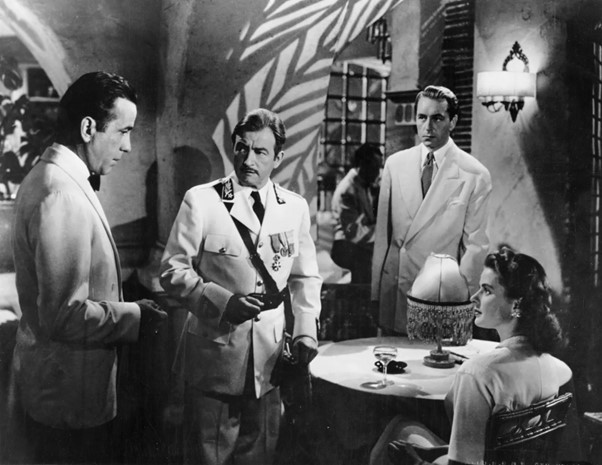Poker, a game of strategy, bluffing, and reading one’s opponent, has long been a captivating subject for filmmakers. Its inherent drama, suspense, and psychological warfare make it an ideal backdrop for storytelling. From the smoky rooms of classic cinema to the high-stakes glamour of modern films, poker has consistently been portrayed as a game that’s as much about human nature as it is about the cards in hand.
The allure of poker in cinema extends beyond the thrill of a good hand or the tension of a high-stakes bet. It reflects broader themes: of ambition, risk, fate, and the human drive to overcome the odds. Iconic poker scenes have not only captured the essence of the game but have also provided audiences with unforgettable cinematic moments, highlighting character development, narrative twists, and the cultural nuances of their respective eras.
The Early Days: Poker in Classic Cinema
Join the PERA (Personal Entertainment Research Assistant) waitlist.
The World's Most Indispensable Movie App
The RunPee app tells you the best times to
run & pee during a movie
so you don't miss the best scenes.
Download the RunPee app.
100% free (donation supported)
In the golden age of Hollywood, when black and white films reigned supreme and characters were larger than life, poker often played a central role in capturing the essence of the times. Cinemas were awash with portrayals of Wild West saloons, riverboat gamblers, and shady underground establishments, offering audiences a vicarious thrill through the medium of the silver screen.
Iconic Moments and Filmic Legends
What people are saying
about the RunPee app.
Must have app if you love the movies
If you’re like me and enjoy a 92oz soda as part of the movie experience, you’ll be thankful for this app telling you the best times to go for a quick break. Whether that’s to refill your soda or recycle it.
Possibly an even better feature is the info on if the movie has after credits scenes. There’s nothing worse than sitting there reading about who the key grip was, then finding out that’s all you did. I blame Marvel for the stupid trend.
Seriously, I see a dozen movies a month and use this app every single time. Worth every Penny of the infinity coin thing I bought.
Developers note: the RunPee app is now, and always will be, 100% free. Donations are optional.
View all reviews
Apple App Store | Google Play Store
Download RunPee app
One of the standout poker moments from this era is undoubtedly from “The Cincinnati Kid,” directed by Norman Jewison. Released in 1965 and starring Steve McQueen and Edward G. Robinson, the film encapsulates the spirit of the game, showing it as a battle of wits, luck, and human resilience. McQueen’s character, an ambitious young poker player, takes on the seasoned and reputed Robinson in a high-stakes game, with each hand revealing more about their characters than words ever could.
Then there’s “A Big Hand for the Little Lady,” a 1966 film that throws a delightful twist into the mix of traditional poker tales. With a cast led by Henry Fonda and Joanne Woodward, the story revolves around a high-stakes poker game where fortunes are won and lost in a heartbeat. But it’s the unexpected turn of events and the underlying theme of women’s empowerment that sets this movie apart.
In essence, the early portrayals of poker in film were not just about the adrenaline of the game. They were snapshots of society, capturing the hopes, dreams, and fears of an era. As we move through the chronicles of cinematic poker, it’s fascinating to observe how the game has evolved, both in its portrayal and its significance.
‘Rounders’ and the 90s Revolution
As the cinematic landscape evolved and audiences craved more nuanced, gritty narratives, the portrayal of poker followed suit. The 90s saw a shift in tone from the glamorous, larger-than-life poker scenes of classic cinema to a more raw and realistic portrayal of the game. This was a decade marked by the rise of the anti-hero, a protagonist not necessarily bound by traditional hero virtues. Amidst this backdrop, poker became a narrative device that underscored their internal conflicts and moral ambiguities.
Groundbreaking Portrayal in “Rounders”
Enter “Rounders” (1998), directed by John Dahl and featuring Matt Damon and Edward Norton. This film stands as a watershed moment in the cinematic representation of poker. Far from the opulent casinos and glitzy charm, “Rounders” delves into the underground world of high-stakes poker rooms and the individuals who inhabit them.
Damon’s character, Mike McDermott, a law student with a talent for poker, wrestles with his passion for the game and the pressures of a ‘normal’ life. As he gets sucked deeper into the world of underground poker, navigating its dangers and temptations, the game becomes a metaphor for life choices, personal sacrifice, and the eternal conflict between passion and responsibility.
The Cultural Impact and Texas Hold’em
“Rounders” did more than just provide a gripping narrative; it also introduced many viewers to the game of Texas Hold’em, now one of the most popular poker variants globally. Scenes meticulously depicting the strategy, psychology, and nuances of Texas Hold’em not only educated audiences but also sparked a renewed interest in the game.
Furthermore, this film laid the groundwork for the poker boom of the early 2000s. As audiences around the world watched Mike McDermott’s journey, many were inspired to take to the felt themselves, leading to a surge in poker’s popularity both land-based and new free spins no deposit casinos.
Poker in James Bond Films
The world of James Bond, with its blend of elegance, danger, and sophistication, has always been synonymous with high-stakes situations. Whether defusing a bomb or chasing villains across rooftops, 007 often finds himself in scenarios where every move counts. It’s no surprise, then, that poker – with its psychological warfare, high stakes, and innate suspense – fits seamlessly into the Bond universe.
Bond’s History with Poker
While James Bond’s association with casinos dates back to the origins of the franchise, poker has not always been his game of choice. In Ian Fleming’s novels and the earlier films, Bond was often seen at the Baccarat table. However, as poker’s global popularity surged, especially Texas Hold’em, it was a natural choice to introduce the game into the world of cinematic espionage.
“Casino Royale”
Perhaps the most iconic poker scene in the Bond series can be found in “Casino Royale” (2006), directed by Martin Campbell. Starring Daniel Craig in his debut as 007, the film places a significant emphasis on poker, weaving it intricately into the movie’s narrative.
Set in the luxurious Casino Royale in Montenegro, Bond engages in a high-stakes poker tournament against the film’s antagonist, Le Chiffre, played by Mads Mikkelsen. But this isn’t just a game; it’s a battle of wits, with the fate of millions of dollars – and more importantly, global security – hanging in the balance.
The prolonged poker sequence in the film is nail-bitingly intense. The stakes are not just financial but deeply personal. With subtle tells, calculated risks, and dramatic turns of the cards, the game mirrors the cat-and-mouse dynamic that Bond and Le Chiffre share throughout the film. It’s a masterclass in tension, with poker serving as both a literal and metaphorical battlefield for the two adversaries.
More Than Just a Game
What makes poker in Bond films so engaging is the layered complexity of these scenes. It’s not just about winning the pot; it’s about gaining the upper hand, outwitting the opponent, and, in Bond’s case, often saving the world in the process. The poker table becomes an arena where strategy, intuition, and courage intersect, and where a single decision can have monumental consequences.
In the world of 007, poker is more than just a game; it’s a dance of intellect and instinct, mirroring the broader themes of danger, duty, and determination that define the James Bond saga.
The Deeper Narrative of Poker in Film
Beyond the tension of the game and the dynamics of its players, poker often serves a more profound, symbolic role in movies. Filmmakers use the game not just as a plot device, but as a metaphorical tool to explore deeper human themes and societal issues. Let’s delve into how poker transcends its literal representation and what it symbolizes in cinema.
Poker as a Reflection of Life’s Uncertainties
Life is inherently uncertain, and like a poker game, we never truly know the hand we’ll be dealt next. Many films employ poker as a metaphor for life’s unpredictabilities. Each decision made at the poker table, whether to fold, bet, or go all-in, can be likened to the choices we make in our lives, where the stakes are often much more than just chips.
A Game of Faces: The Masquerade of Identity
Poker is as much about playing your cards as it is about reading your opponent. The game often emphasizes the importance of a “poker face” – a facade put up to mask one’s true emotions and intentions. In cinema, this becomes a potent symbol for the masks we wear in society, concealing our vulnerabilities and fears. Characters embroiled in poker scenes often undergo moments of self-revelation, where their facades crumble, revealing their authentic selves.
Risk, Reward, and the Human Psyche
Central to poker is the theme of risk. Do you play it safe or risk it all in hopes of a bigger reward? Films often use this dynamic to probe the human psyche’s depths, exploring themes of ambition, fear, and the lengths individuals are willing to go to achieve their desires. The poker table becomes a battleground where characters confront their innermost fears and aspirations, making decisions that will shape their futures.
Poker as a Social Commentary
Many films use the poker table as a microcosm of society, reflecting broader issues like class distinctions, gender dynamics, and the often capricious nature of fortune. By situating characters from diverse backgrounds around a poker table, filmmakers can provide sharp insights into societal structures, prejudices, and the often-blurred line between right and wrong.
Conclusion
Poker, in its cinematic portrayal, often transcends its role as a mere game. Through the strategic use of symbolism and themes, filmmakers elevate poker scenes into profound explorations of human nature, societal norms, and the intricate dance of fate and free will. These deeper narratives remind us that every hand dealt, every bet placed, and every bluff called is a reflection of the larger tapestry of life and the stories we weave within it.





